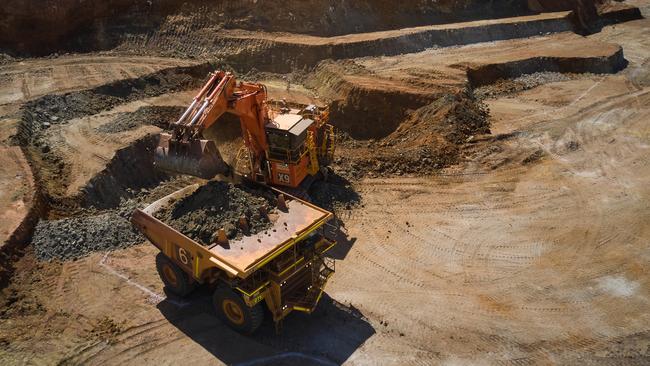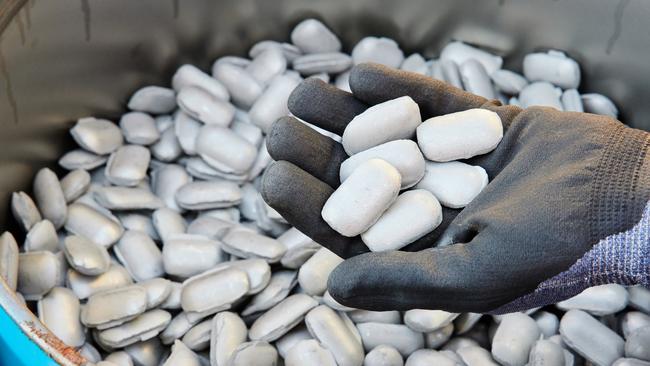Glencore chief Gary Nagle says Australia has fallen behind Canada as the investment nation of choice
As the Swiss owner of Australia’s biggest coal producer mulls which country to invest its billions in, Glencore’s chief has a stark warning for the federal government.

Mining giant Glencore has raised the alarm on the risks of doing business in Australia, saying an array of government interventions and tax rises have led to the nation falling behind Canada as the world’s top investment destination for commodity producers.
The Swiss-based Glencore, which is Australia’s biggest coal producer, has been caught in the crosshairs of several major new imposts, including Queensland’s royalty increases, NSW’s coal reservation scheme, and the Albanese government’s looming safeguard mechanism.
Chief executive Gary Nagle visited Australia last week to tour the company’s mines and hold meetings with politicians in Canberra and said the nation had become a more difficult prospect as it weighs where to invest across its global operations.
“Australia has become more challenging. It’s generally acknowledged in the industry that Australia and Canada were the benchmarks in terms of secure investment jurisdictions. What we’ve seen over the last 12 months or so is some gap opening up between Canada and Australia,” Mr Nagle told The Australian.
“There is a finite pool of capital that is allocated to projects around the world and Australia has probably become a less obvious place to invest incremental capital over the last 12 months.”
The comments mark a rare intervention by one of the world’s most powerful mining executives. While Glencore surged to a record annual profit in February on the back of booming oil and coal prices, it has shown a willingness to pull back from lucrative projects in Australia if the investment environment fails to stack up.
Glencore in December pulled the plug on a $2bn coalmine in Queensland, backing away from the major thermal coal development in the face of the state’s royalty increases and the federal government’s industrial relations changes.
It’s also had to put on ice a $1bn extension of the existing Glendell coalmine in NSW’s Hunter Valley that produces both thermal and coking coal after an adverse ruling on heritage concerns.

Mr Nagle said he had been dismayed by a lack of industry consultation.
“One of the contributing factors to placing our Valeria coal project on hold was the super royalty hike in Queensland, which occurred with no industry consultation,” Mr Nagle said.
Glencore has also been among coal companies critical of Anthony Albanese’s deal with the Greens to pass Labor’s signature climate policy, saying the reforms needed to achieve emissions reductions without “destroying the jobs and investments that are critical to the national economy”.
The rocky global pivot to renewables across the world also remains a point of concern for the top Glencore boss, with Australia among nations struggling to achieve a smooth transition from its coal-based sources of generation for electricity.
Mr Nagle said energy prices would remain elevated for some time as volatility continued across the global economy.
“There is a global energy shortage. We should expect a number of years of high energy prices as the world transitions to renewables and low-carbon energy sources,” Mr Nagle said.
Russia’s war in Ukraine lifted commodity prices across the board and has led to several earnings cycles of super profits for big miners across the globe, including Glencore.
Glencore is weighing how to spend capital across its business and said options including copper in Australia were in the mix. Mr Nagle has said Glencore is still on the hunt for more copper and other critical minerals, with the company saying it could increase its net debt to $16bn for acquisitions, from current levels of close to zero. “We have significant growth opportunities within our global business,” Mr Nagle said.
“We produce a million tonnes of copper. We have the potential to double it, mainly through brownfield projects and one greenfield project. We will do that over a period of time that is consistent with market conditions. We wouldn’t want to bring those tonnes into the market too early when the market doesn’t need them.”
Glencore also pointed to strong interest in the company from US investors, noting their “pragmatic and commercial approach” compared with traditional European shareholders.
“Our share register has seen shifts from the traditional European markets to the US markets, where there continues to be a more pragmatic and commercial approach to investing,” he said.
“What has attracted them? We see various factors including good shareholder returns and cashflow yield, with a focus on M&A where it makes sense for the business, all while clearly having a responsible and ethical approach to business operations.”
Glencore said last year the decision on its Queensland pullback included global factors – such as the need to reduce carbon emissions, rising geopolitical tensions and long-term uncertainty over future demand for coal – along with domestic political uncertainty that made it less attractive.


To join the conversation, please log in. Don't have an account? Register
Join the conversation, you are commenting as Logout